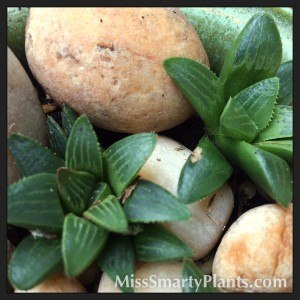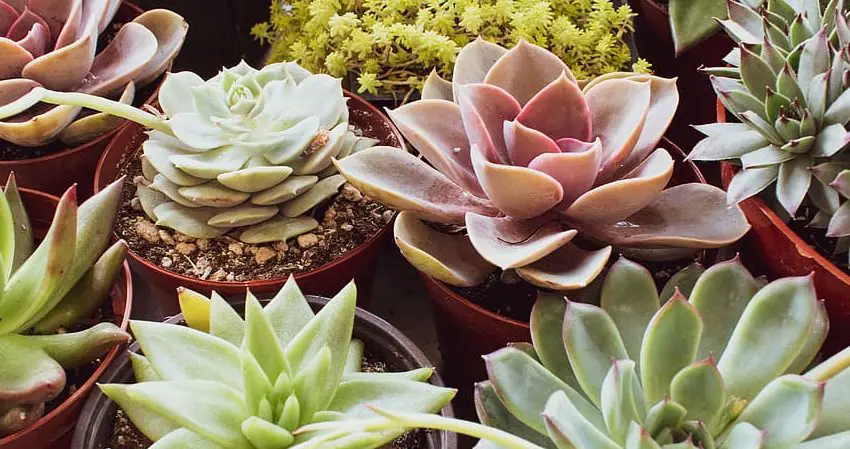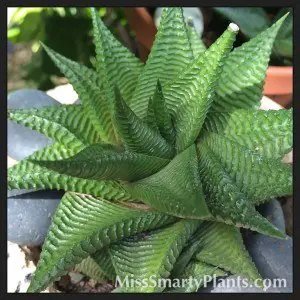Last Updated on November 17, 2022 by Gary Stephen
Succulents are hot right now. Look through any gardening website, decorating magazine, or go crazy on Pinterest to see the designs and uses for this group of plants. From containers to wreaths to temporary installations, succulents have compelling shapes and colors that make them ideal for a wide range of displays. This article will provide concepts for basic care and design uses that can easily be incorporated into your home and will flourish in low light levels.
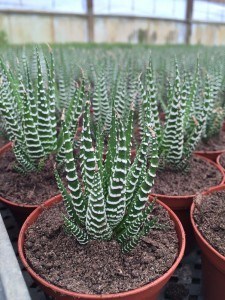
Haworthia zebrina
Succulent Care
Not surprisingly, succulents will require less frequent watering than most interior plants. Plants that are continually overwatered will be prone to rot, disease, and a general decrease in plant vigor. I like to maintain succulents by monitoring the turbidity, or the stiffness of the leaves. Turgidity is the plant having ample water to keep the leaves full or turgid, resulting in the swollen and dense feeling of a healthy plant.
When succulents first experience water stress the leaves will be slightly soft, indicating that the plant needs water.
So go ahead and give those leaves a little squeeze! It will help you determine when you should water– by the plant’s needs and not a calendar.
Soil for Succulent Care Indoors
To keep plants dry, good drainage is key for long-lived succulents. I do not recommend special cactus or succulent mixes as necessary if watering can be closely monitored. A high quality, lightweight potting soil does well if plants are to be permanently installed. In my experience, adding generous amounts of Turface, or calcined clay mix will help to maintain a very light soil well also increase drainage.
For some reason, the pervasive habit is to add sand to the soil, resulting in a very heavy and dense mix that is detrimental to succulent health. Additionally, the very fibrous, small root systems of succulents make them ideal for dropping the pot into existing container displays.
Fairy’s Washboard Plant, Haworthia limifolia
Selection for Succulent Care
The variety of jewel-toned succulents that are available can be mesmerizing. From oranges and chartreuse to deep purples and reds, there is a variety of succulent for almost the color of the rainbow. Almost all of these will succeed given high-level light conditions and low humidity.
What if you have less than ideal conditions?
Low light levels can be challenging, and under these conditions, it is hard to maintain the deep oranges and yellows of many of these plants. So it may be worthwhile to consider some of the other very architectural succulents that can tolerate low light.
Succulents that tolerate low light levels include Haworthia, Gasteria, Sedum, Aloes, and even Kalanchoes. These varieties will thrive in darker areas, making them ideal for inside the home. These plants will maintain their growth and serve as long term plans.
The other side of the coin is to consider using the wide range of succulents available but treat them as temporary color displays. According to Tristen Bowen, Landscape Manager with Marriot Vacation Club, “You will find a lot of nice succulents that you would like to use in gardens or as interior plants but you have to use them understanding it will be short-lived. In the low light setting, they become stretched looking for more light.”
When these plants start to stretch and the space between leaf nodes increases it is a key sign the plant is ready for replacement.
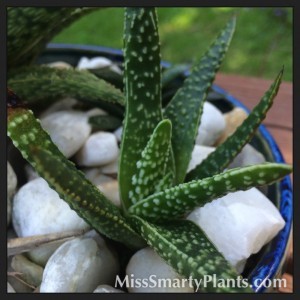
Gasteria
Design for Succulent Care
The possibilities for incorporating succulents into designs are as limitless as the varieties of succulents themselves. Since succulents are so easy to root from cuttings and need so little root space, they are easily “planted” on ornaments. Bowen suggests “using a single succulent in an upright or unique container can provide a very clean and modern look. Also, repurposing antiques into succulent gardens, like sifters and funnels, can provide a fun, eclectic, crafty, and shabby chic look.”
Masses of succulents can be grouped for effect and for emphasis of both color and texture. With the clean lines of most varieties, contemporary and geometric effects are possible. Always keep in mind the low water needs of succulents and select companion plants accordingly. Bromeliads, Foxtail fern (Asparagus densiflorus ‘Myersii’), Sansevierias, ZZ Plant (Zamioculcas zamifolia), or Jade Plants (Crassula ovata) all provide good options.
Take time to consider adding a top dressing to your plants. Whether in containers or in larger plantings, this will help to keep the plants clean and also set-off designs. Are you looking for a more contemporary look? Polished pebbles keep the clean lines you are looking to achieve. Tumbled glass, stone, and seashells are a few options to complete your interior plantscapes with a very professional appearance.
Where will you incorporate succulents?
Consider the qualities of these plants and the possibilities are endless. Succulent cuttings will last three to four weeks without showing distress. So perhaps a live element to a holiday display is easier than ever imagined.
Expert Debra Lee Baldwin describes gluing succulent cuttings to the top of pumpkins in her book Succulents Simplified for a fall decoration. If adding succulents can be that easy, there is no end to the places these plants can be incorporated in interior plantscapes.
Given the popularity of succulents, succeeding with these plants is a trend that your team and business need to grab a hold of and incorporate this year. Whether you use them as a new type of annual color or look for longer-term solutions to difficult areas. This group of plants is sure to find a valuable place in your plant palette.
For more inspiration on succulents, you can visit https://succulentbar.com/2020/11/17/caring-for-your-succulents/.
